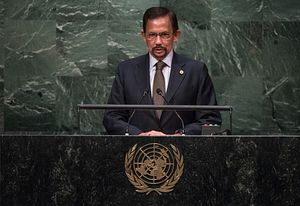Relations between the Islamic and Christian worlds have seen their fair share of tensions and even conflict, particularly in the Middle East where both faiths were initially fostered. That animosity is also being fostered in the tiniest corners of Earth where religion is often fashioned for political gain.
In Brunei, criticism of the monarch Hassanal Bolkiah is strictly forbidden, alongside acts of charity. As one senior government observer told this reporter: “Charity implies His Majesty is incapable of looking after his own people.”
Such attitudes are difficult to challenge, particularly since Bolkiah began imposing Sharia law on his tiny oil-rich Sultanate more than two years ago. It was gradual process, culminating with a ban on Christmas festivities, including the wearing of Santa hats in public.
The ban was initially introduced a year ago. Despite an international outcry back then and for all the hallmarks of the bigotry it entails, the monarch and the Islamic clergy are insisting it will continue.
Under such laws, Muslims caught celebrating Christmas festivities face five years in jail. The fear is that Christmas could lead Muslims astray, even though such laws are impossible to enforce.
Realizing this, the imams of the local mosques have told their flock that it is okay to attend festivals on December 25 that are held within their own local communities – as long as the Christian reasons behind the celebrations are not advertised. Effectively, nativity plays are to be held in secret.
Imams have also warned followers during Friday prayers that Christmas greetings, trees and songs along with decorations ran counter to the Islamic faith. Ministry officials have also been personally asking businesses to pull down Christmas displays.
Brunei has earned itself comparisons with Saudi Arabia and Pakistan since Sharia was formally introduced in May, 2014, with Bolkiah evoking the divine right of kings: “It is because of our need that Allah the Almighty, in all his generosity, has created laws for us, so that we can utilize them to obtain justice.”
Priests have since warned that a simple baptism could constitute a breach of the nation’s penal code. Under sharia law, capital punishment by stoning to death, floggings, and the amputation of limbs are options to guard against theft, adultery and gay relationships. Sodomy, blasphemy, drinking alcohol and pregnancy outside of marriage are also illegal. Penalties can be imposed on people who were under the age of 18 when a Sharia crime was committed.
Human rights groups were outraged by the new laws and Bolkiah – among the world’s richest men – was subjected to boycotts and angry protests at the hotels he owns in Britain and the United States, including the plush Beverly Hills Hotel.
Their actions also cast an unwanted light on the royal family, whose members have a well-established reputation for partying, the good life and excess, particularly in London where casinos have held a long and deep fascination for the King’s offspring.
The crackdown on Christmas was announced by the Religious Affairs Ministry, which according to the Brunei Times, was “… intended to control the act of celebrating Christmas excessively and openly, which could damage the aqidah (beliefs) of the Muslim community,”
It also reminded non-Muslims that disclosing or displaying Christmas celebrations violated the penal code which prohibits propagating religion other than Islam to a Muslim.
Brunei has a population of 420,000 people. Thirty-two percent are non-Muslim made-up largely of foreign workers, many of them from the Philippines, which is predominantly Catholic.
The Sultanate also sits on the edge of Sabah, an East Malaysian state where a significant Christian population has seen its influence wane after years of encouraged migration from the country’s Western states, orchestrated by the former Malaysian prime minister Mahathir Mohamad.
Luke Hunt can be followed on Twitter @lukeanthonyhunt
































